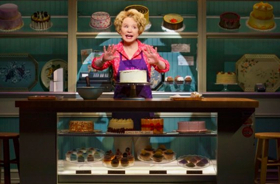Review Roundup: What Did The Critics Think of MTC's THE CAKE, Starring Debra Jo Rupp?
|

Manhattan Theatre Club's New York premiere of The Cake, written by Bekah Brunstetter and directed by MTC's award-winning Artistic Director Lynne Meadow, opened last night, March 5 at the MTC at New York City Center - Stage I (131 West 55th Street).
The cast of The Cake features Marinda Anderson (Teenage Dick, Far From Heaven), Genevieve Angelson (Vanya and Sonia and Masha and Spike, The Upside, "Good Girls Revolt"), Dan Daily (The Rivals, Seabiscuit, The Wolf of Wall Street), and Debra Jo Rupp ("This Is Us," "That 70s Show," "Friends").
All is going well for Della. Her North Carolina bakery is legendary and she's just been cast on her favorite television baking competition. But then, her late-best-friend's daughter comes home from New York City to ask her to make a cake for her upcoming wedding. When Della learns that Jen's about to marry a woman, she is forced to re-examine her deeply held beliefs, as questions of morals, judgment and family swirl around them all. This emotional and deliciously funny play was created by Bekah Brunstetter("This is Us"), and is staged by MTC Artistic Director Lynne Meadow.
Let's see what the critics are saying...
Jesse Green, The New York Times: But some changes are not improvements. A few added lines referencing the election of Donald J. Trump overeagerly underline the play's political position, as if there were any doubt of it. And Ms. Brunstetter has doubled down on the surrealism of five interstitial scenes in which Della imagines herself on the baking show. Meant to ratchet up tension, they cheapen it instead.
Frank Scheck, The Hollywood Reporter: The play ultimately isn't very thought-provoking, but it's certainly entertaining. Its gentleness feels almost reassuring in this era of nasty political and cultural divides. It's hard not to wish the playwright had explored the situation in greater depth or given her characters more nuance. But Brunstetter's crowd-pleasing instincts prove spot-on, especially in the hilarious scene in which Della's husband also attempts to rekindle their marriage in gustatory fashion. Suffice it to say that you'll have difficulty the next time you attempt to dig into a plate of mashed potatoes.
Barbara Schuler, Newsday: It's Rupp, the star of the show since it debuted in Los Angeles in 2017, who gives the production a reason for being. She's the Energizer Bunny of baking, a delight as she flits about the gem of a bake shop (set by John Lee Beatty), softly speaking her own personal gospel about the importance of always following the directions. In the kitchen? In life? No matter, it's a beautifully nuanced, layered portrait of a woman in conflict with her own beliefs.
Robert Hofler, The Wrap: Rupp makes Della very much worth watching in her opening monologue as she tells us how to bake a cake. She's a baker and her cake shop is located in Winston-Salem, North Carolina. Della is funny, homespun and thoroughly committed to the art of turning us all into diabetics. When Della's talking butter and sugar, "The Cake" tastes just right. When Della segues to the Bible, the play is very underbaked.
Jesse Oxfeld, New York Stage Review: But even with its flaws, this play works, on the strength of its sympathetic takes and Brunstetter's sharp script. The Cake, as it turns out, is sweet.
Steven Suskin, New York Stage Review: ...as the opening scene goes through its paces, you might think: Ah, the playwright is on to something true and important and what a wonderful character she has contrived for the play's center. You might eagerly look forward to how she will weave it all into a hopefully provocative social statement grounded in truth. In the end, though, you might find yourself reasonably entertained but distinctly let down. Unlike the Colorado case, this one is played-the further we proceed-for laughs and a feel-good ending, which is a perfectly practical choice by the playwright but trivializes what hinted to be a provocative message.
Videos
.png)